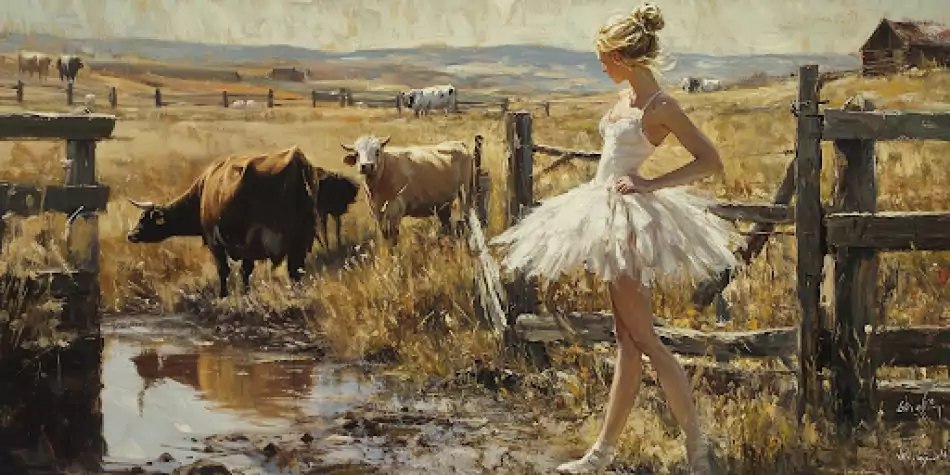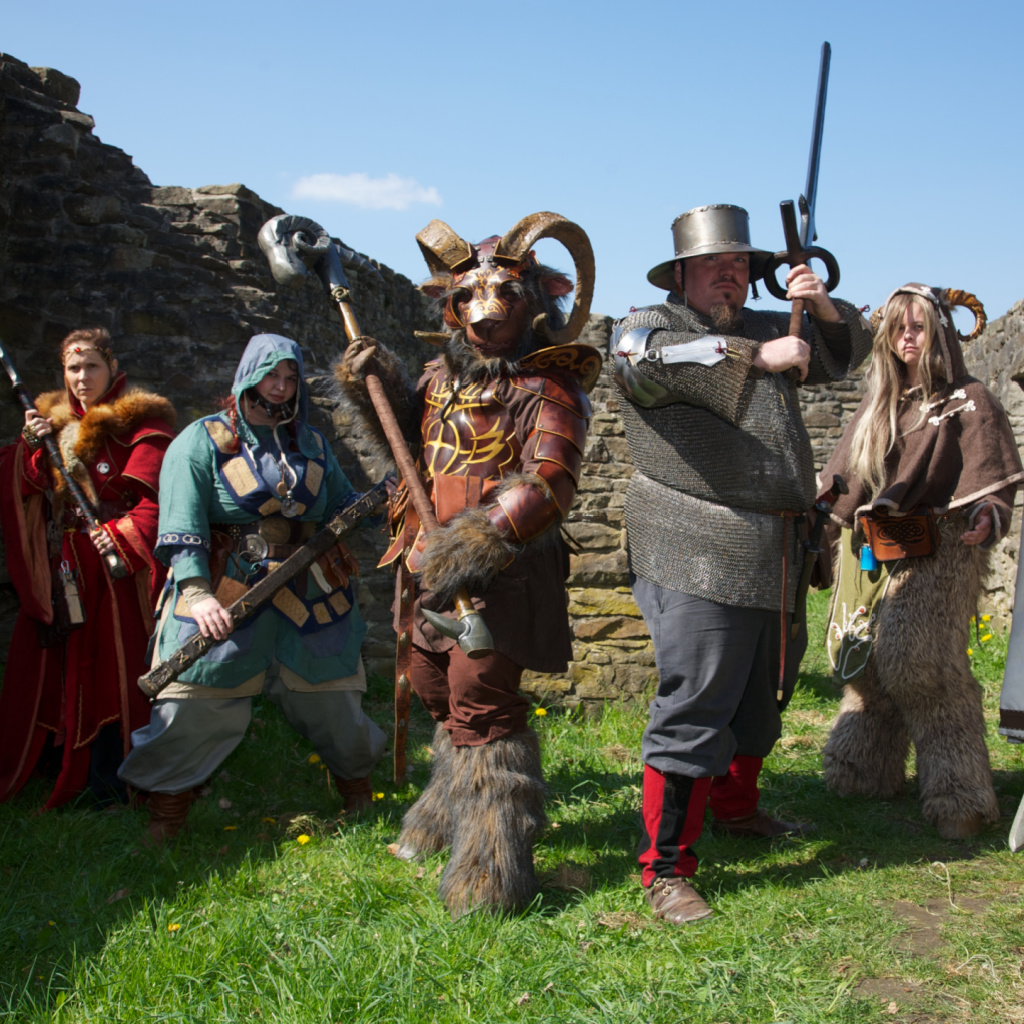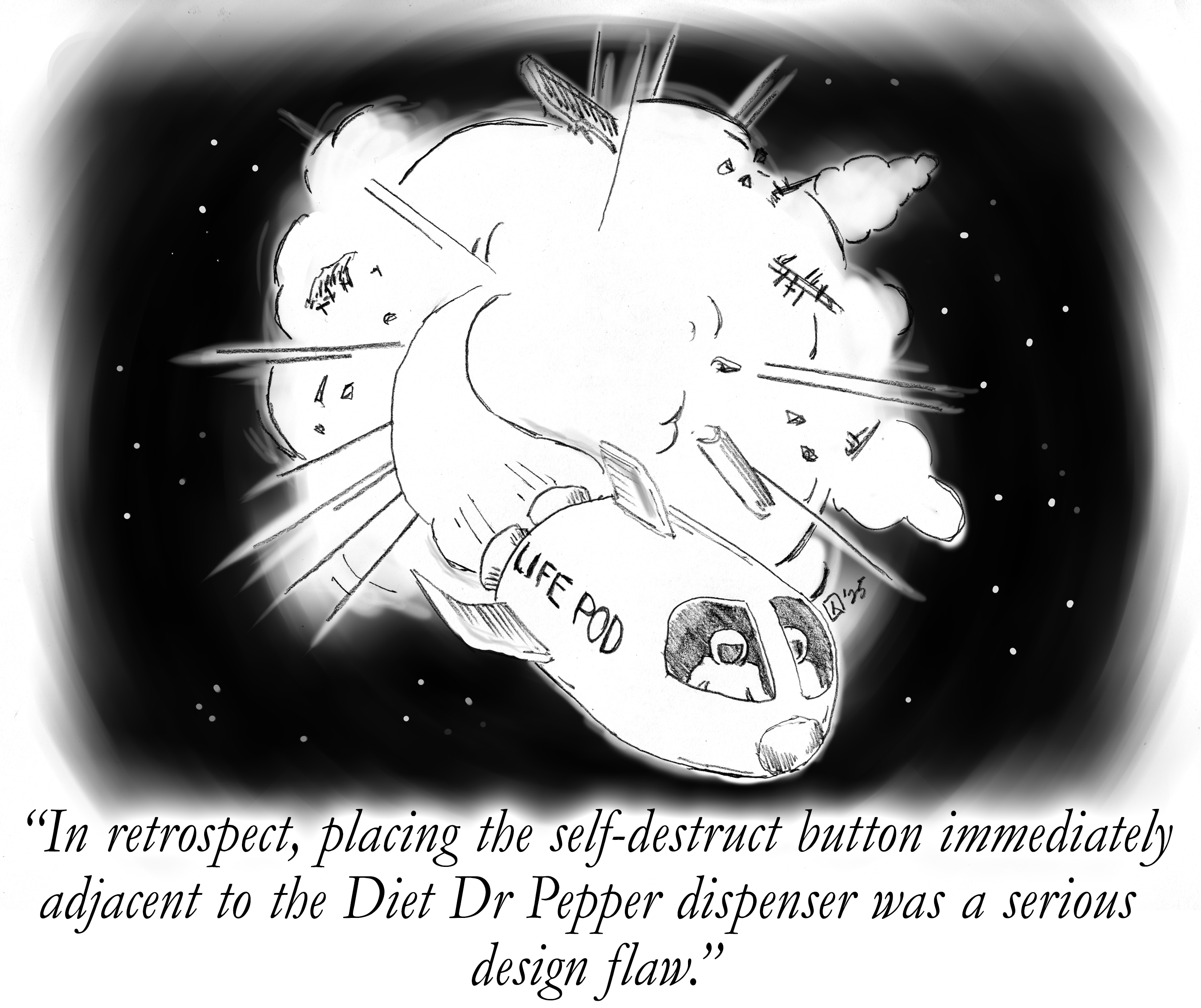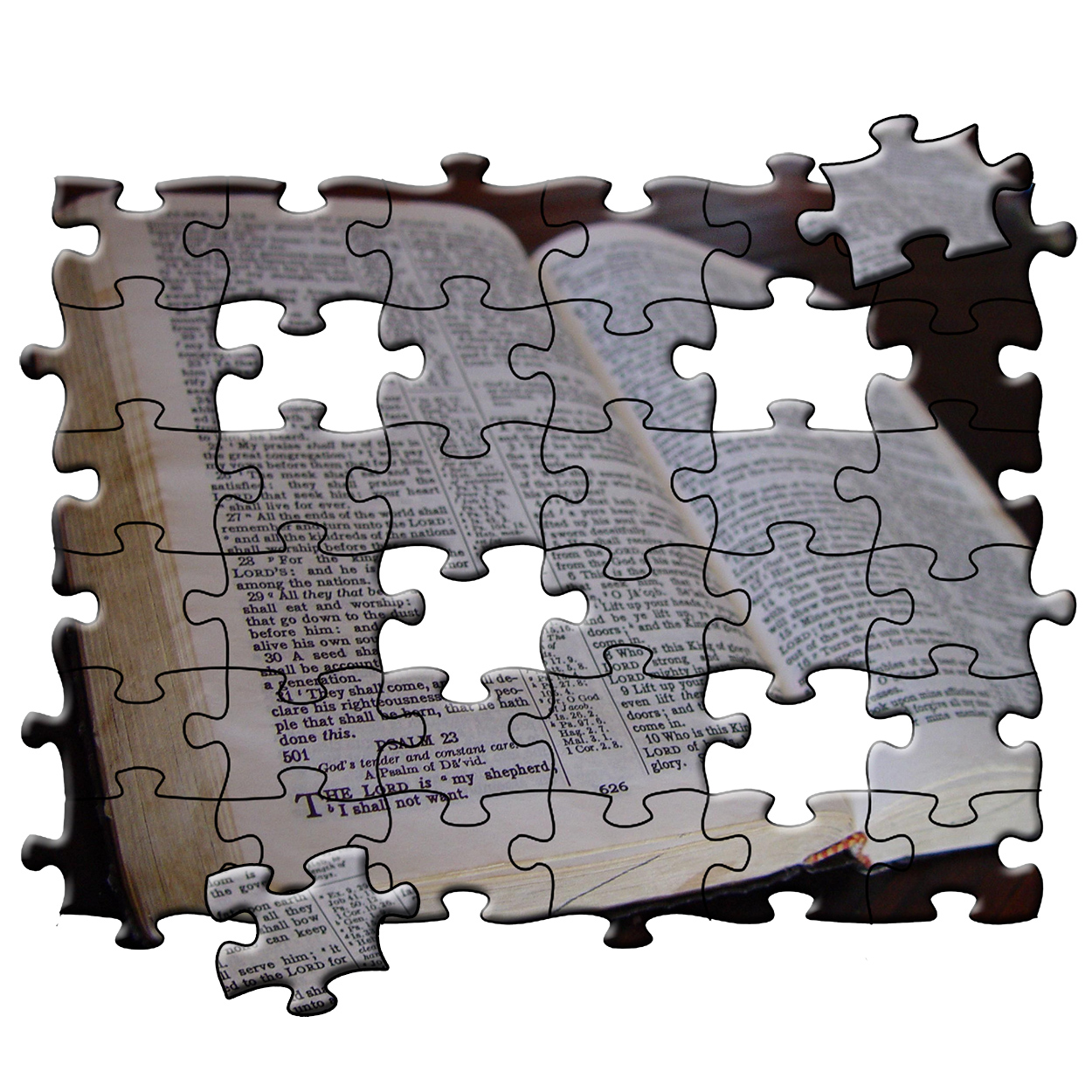I remember my sister once telling me about a family she followed on social media who took their milk cow on a camping trip because the cow still needed to be milked while they were gone. She thought it was the cutest thing and it confirmed her desire to someday have a milk cow. I heard that story and it reminded me why I never want a milk cow. Their choice to have a cow and to bring it camping didn’t threaten me as someone who chooses a life free of milk cows. It was just a funny little curiosity that came and went in our day’s conversations.
That was my first introduction to Ballerina Farm and the Neeleman family, though my sister could remember neither name at the time. Hannah Neeleman is the poised and beautiful face of their social media, which presents in idyllic, almost nostalgic colors, the homespun adventures of her life with her husband Daniel, and their eight children living on a 328-acre farm just outside of Kamas, Utah. Though the details of their life on the farm should, like the cow on the camping trip, present no threat to anyone with a different life and different choices, her 10 million follower count on Instagram means that their life, as it plays out on the social media stage, garners the attention and criticism of many. A July article in The Times on the family went viral after it made some strong and fairly offensive inferences about their marital dynamic, which were based on the author spending a single day with them and likely coming in with an angle presupposed. Their life presents no threat to anyone.
That particular aspect of the author’s analysis struck a personal chord with me. I went on my first date with my future husband the week before I moved to New York to pursue acting professionally and even as I landed in this bustling city dragging my luggage through Harlem looking for my new address, I could already feel that I might one day love that man more than this place. I flew back and forth from New York to the UK for a Master’s degree in writing and dreamed about various kinds of success. Now, I have three little children, live in a home far from any iconic metropolis and my big, beautiful writing desk is often blocked by giant hot wheel tracks and unfolded laundry, and sometimes I’m the one that puts them there. Hannah Neeleman’s would-be ballet studio becoming a school room for their homeschooled children sounds like an indication of practicality not patriarchy.
Agnew described Hannah Neeleman as a woman who “milks cows, gives birth without pain relief and breastfeeds at beauty pageants” and asked an interesting either/or question, though I think was unwilling to give both apparent answers equal possibility, “Is this an empowering new model of womanhood—or a hammer blow for feminism?”
The quiet query that follows such a question is what is feminism? It is only a hammer blow if it flies in the face of what feminism actually is. I naively thought feminism was a movement that fights for the rights of women to freely pursue any life they want, including raising a large family, cooking sourdough from scratch, and drinking milk straight from the cow. From the rhetoric surrounding the most recent election, however, it would seem feminism only includes a woman’s right not to have a child, even if it is the natural consequence of choices she has made. Those same people fiercely fighting for that apparent right do not rally quite as vocally around a different woman’s right to raise a large family. The quiet query that follows such a question is what is feminism?
“But Agnew (and the online chorus of Hannah’s detractors),” author Sarah Baird points out, “never meaningfully addresses why the Neelemans’ life might be inspiring; she doesn’t really seem curious about that.”
This author, and many other voices online, do not even leave room for the possibility that Hannah may love and value her country life and her meadows of bright-eyed, wild, and capable children as much as she claims to online. And that, at least some significant portion of her 10 million followers, are there to watch because they too see the appeal.
I am exactly Hannah’s age and though it is common for anyone to long for their childhood as a simpler time, those of us who came of age as technology advanced in unprecedented ways at the turn of the 21st century literally grew up in a simpler time. Now we have young children growing up in a frighteningly complex one while we attempt to navigate it with noisy, crowded, and conflicting technology as both our instruction and destruction. At times, I feel towards smart phones not unlike J.R.R. Tolkien felt towards the invention of the combustion engine:
It is full Maytime by the trees and grass now. But the heavens are full of roar and riot. You cannot even hold a shouting conversation in the garden now, save about 1 a.m. and 7 p.m.—unless the day is too foul to be out. How I wish the ‘infernal combustion’ engine had never been invented.
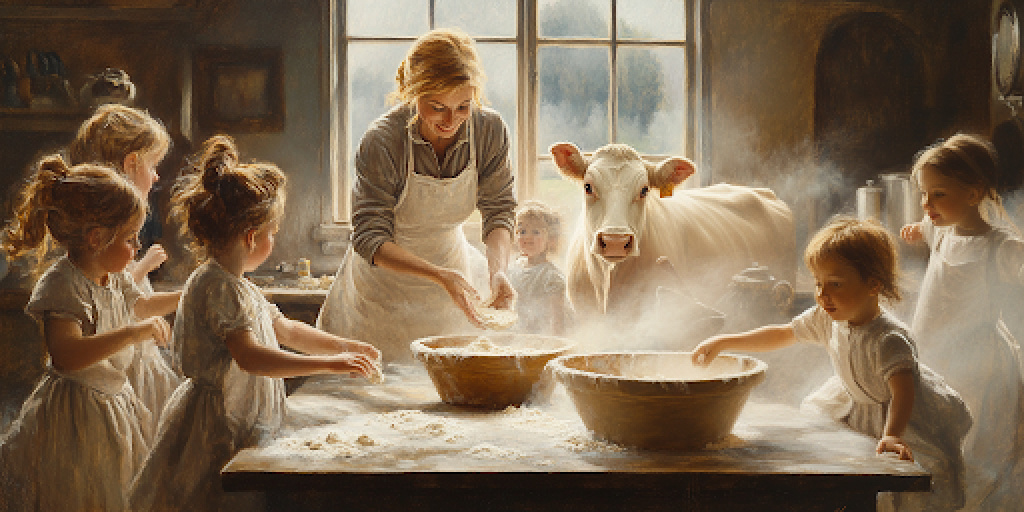
The world of social media is noisy and the overstimulation of motherhood is made worse by screens that constantly notify us of equal parts calamity and opportunities for overconsumption. We struggle to healthily navigate it ourselves and don’t know how to begin to teach our children to do better than we can. Enter a little glimpse into a simpler world. Ballerina Farm may be performance art, but the reason we’re still talking about it is because it’s so well done. The wholesomeness at the center of its aesthetic is something many of us are deeply craving. Maybe somewhere off in the rolling rural hills, a world still exists where kids have dirt under their fingernails and run through pastures and make lemonade out of a fistful of dandelions and rhubarb they found in the yard instead of fighting over iPads. Maybe I can’t have the farm, but it’s possible I could turn off the TV and let my 3-year-old help me feed our very first sourdough starter.
Perhaps some women just look at “former professional ballerina” now “mother of eight” on paper and can’t help but write the story of a life that took a left turn. But their perception of what fulfilled womanhood looks like doesn’t matter. It’s Hannah who gets to decide if she’s happy. “When I first started dancing … I felt like dance was a part of me, a part of who I was meant to be,” Neeleman said in a clip from nearly a decade ago, while pregnant with her second child, “and later on, as I’ve become a mother, I felt that same connection to this calling—that it’s a part of me, that it’s who I was meant to be. I really feel like I was meant to be a mother.” It’s Hannah who gets to decide if she’s happy.
There is a place for vulnerable, relatable mom-content that makes you feel less alone as you sit in a bathrobe at 4 p.m. in a wrecked house with the TV as your only salvation. There’s also a place for content that distills the magic of what motherhood could be and sometimes really is.
I saw a brief clip of her teaching the candidates at the latest Mrs. American pageant some interview skills before the event where she would hand over her crown to one of them. She is in full glam make-up, high heels and has her baby carrier strapped to the front of her. She seems completely unencumbered by the presence of her baby and later wears her Mrs. American sash right over the top of the baby for photos. She made no attempt to downplay or hide the baby’s presence nor did she seem to be flaunting it. It was just a beautiful little fact of her current stage that she brought along for the ride.
That normalization of having a baby with you in public or even a professional setting is in stark contrast to the growing number of social media posts that say “babies shouldn’t be allowed on planes” or “people, stop bringing your kids to restaurants” and the growing popularity of the “child-free wedding”.
The alarming extension of the societal inclination represented in that article from The Times that says no woman could be freely choosing to have so many children, is a growing public disdain for children in general. What’s so strange about that growing impression is that we were all children ourselves. It’s not some annoying hyper-niche hobby that a tiny portion of the population disruptively dabbles in, it is an essential stage that every single human on this planet goes through. And every one of our childhoods involved an exhausted adult somewhere in the background rooting for us and raising us at great personal expense.
It was, in fact, that same baby’s attendance at the original Mrs. American pageant, with her mother competing 12 days post-partum, that skyrocketed Hannah Neeleman into public conversation. Though perhaps it was the combination of a baby and a ballgown that kept people talking and brought on Megan Agnew’s original question about whether this was a new model of womanhood or a hammer-blow to feminism.
My frank answer to that question is why does it have to be either? I attended the most recent Mrs. American pageant in Las Vegas, where Neeleman was passing the torch, to support a close family member who was competing. It felt very clearly like something I would never be interested in participating in. But I also sat in the lobby afterwards with that family member hearing about all the ways the experience had inspired and empowered her and felt so happy that she got that opportunity. That is feminism. Women supporting women in pursuing excellence and actualization in every sphere and not always rushing to say one form of excellence threatens another by its very existence. That is feminism. Women supporting women.
I can see that someone else was breastfeeding in a ball gown 12 days postpartum and be happy for her and also be happy that 12 days postpartum found me in my own bed snuggling my baby in a bathrobe. I can be overwhelmed with my three children and see someone else enjoying eight and not assume that must mean she’s under someone’s thumb and can’t possibly be choosing that life freely. It’s her right to love the feeling of hands covered in flour and lots of faces to wipe.
But somehow, the more loudly society purports to fight for women’s rights, the less likely they are to include ‘raising a large family and finding joy in homemaking’ as being among them.

